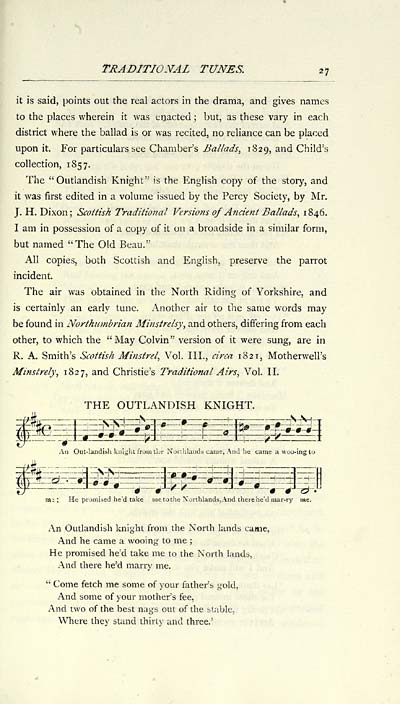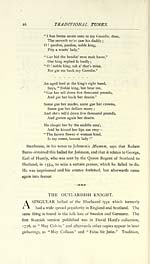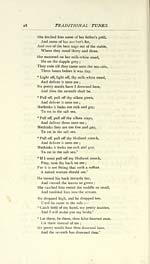Glen Collection of printed music > Printed text > Traditional tunes
(31) Page 27
Download files
Complete book:
Individual page:
Thumbnail gallery: Grid view | List view

TRADITIONAL TUNES. 27
it is said, points out the real actors in the drama, and gives names
to the places wherein it was enacted ; but, as these vary in each
district where the ballad is or was recited, no reliance can be placed
upon it. For particulars see Chamber's Ballads, 1829, and Child's
collection, 1857.
The "Outlandish Knight" is the English copy of the story, and
it was first edited in a volume issued by the Percy Society, by Mr.
J. H. Dixon; Scottish Traditional Versions of Ancient Ballads, 1846.
I am in possession of a copy of it on a broadside in a similar form,
but named "The Old Beau."
All copies, both Scottish and English, preserve the parrot
incident.
The air was obtained in the North Riding of Yorkshire, and
is certainly an early tune. Another air to the same words may
be found in Northutnbrian Minstrelsy, and others, differing from each
other, to which the "May Colvin" version of it were sung, are in
R. A. Smith's Scottish Minstrel, Vol. III., circa 182 1, Motherwell's
Minstrely, 1827, and Christie's Traditional Airs, Vol. II.
THE OUTLANDISH KNIGHT.
An Out-landish knight from the Northlands came, And he came a woo-in? to
yVM-fnlsinHc 4nr1 t\^r>rf\-tf'<] mgr.ni imp
me; He promised he'd take me to the Northlands, And there he'd mar-ry me
An Outlandish knight from the North lands came,
And he came a wooing to me ;
He promised he'd take me to the North lands,
And there he'd marry me.
" Come fetch me some of your father's gold,
And some of your mother's fee,
And two of the best nags out of the stable,
Where they stand thirty and three.'
it is said, points out the real actors in the drama, and gives names
to the places wherein it was enacted ; but, as these vary in each
district where the ballad is or was recited, no reliance can be placed
upon it. For particulars see Chamber's Ballads, 1829, and Child's
collection, 1857.
The "Outlandish Knight" is the English copy of the story, and
it was first edited in a volume issued by the Percy Society, by Mr.
J. H. Dixon; Scottish Traditional Versions of Ancient Ballads, 1846.
I am in possession of a copy of it on a broadside in a similar form,
but named "The Old Beau."
All copies, both Scottish and English, preserve the parrot
incident.
The air was obtained in the North Riding of Yorkshire, and
is certainly an early tune. Another air to the same words may
be found in Northutnbrian Minstrelsy, and others, differing from each
other, to which the "May Colvin" version of it were sung, are in
R. A. Smith's Scottish Minstrel, Vol. III., circa 182 1, Motherwell's
Minstrely, 1827, and Christie's Traditional Airs, Vol. II.
THE OUTLANDISH KNIGHT.
An Out-landish knight from the Northlands came, And he came a woo-in? to
yVM-fnlsinHc 4nr1 t\^r>rf\-tf'<] mgr.ni imp
me; He promised he'd take me to the Northlands, And there he'd mar-ry me
An Outlandish knight from the North lands came,
And he came a wooing to me ;
He promised he'd take me to the North lands,
And there he'd marry me.
" Come fetch me some of your father's gold,
And some of your mother's fee,
And two of the best nags out of the stable,
Where they stand thirty and three.'
Set display mode to: Large image | Transcription
Images and transcriptions on this page, including medium image downloads, may be used under the Creative Commons Attribution 4.0 International Licence unless otherwise stated. ![]()
| Special collections of printed music > Glen Collection of printed music > Printed text > Traditional tunes > (31) Page 27 |
|---|
| Permanent URL | https://digital.nls.uk/87816726 |
|---|
| Description | Scottish songs and music of the 18th and early 19th centuries, including music for the Highland bagpipe. These are selected items from the collection of John Glen (1833 to 1904). Also includes a few manuscripts, some treatises, and other books on the subject. |
|---|
| Description | The Glen Collection and the Inglis Collection represent mainly 18th and 19th century Scottish music, including Scottish songs. The collections of Berlioz and Verdi collected by bibliographer Cecil Hopkinson contain contemporary and later editions of the works of the two composers Berlioz and Verdi. |
|---|

